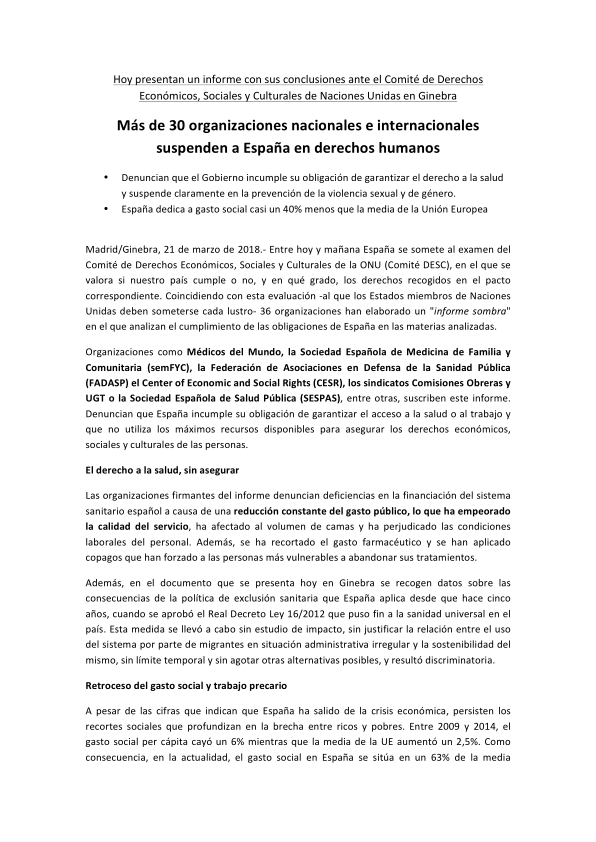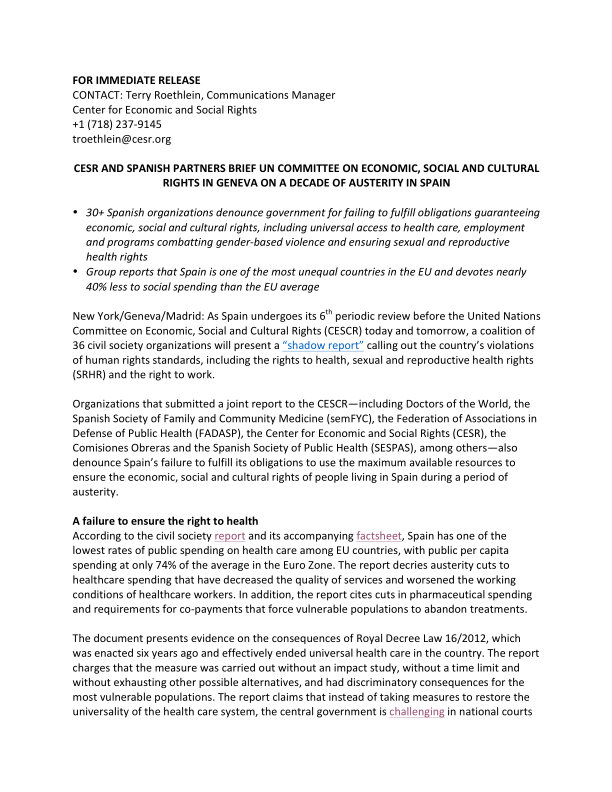New York/Geneva/Madrid, March 21—As Spain undergoes its 6th periodic review before the United Nations Committee on Economic, Social and Cultural Rights (CESCR) today and tomorrow, a coalition of 36 civil society organizations will present a “shadow report” calling out the country’s violations of human rights standards, including the rights to health, sexual and reproductive health rights (SRHR) and the right to work.
Organizations that submitted a joint report to the CESCR—including Doctors of the World, the Spanish Society of Family and Community Medicine (semFYC), the Federation of Associations in Defense of Public Health (FADASP), the Center for Economic and Social Rights (CESR), the Comisiones Obreras and the Spanish Society of Public Health (SESPAS), among others—also denounce Spain’s failure to fulfill its obligations to use the maximum available resources to ensure the economic, social and cultural rights of people living in Spain during a period of austerity.
A failure to ensure the right to health
According to the civil society report and its accompanying factsheet, Spain has one of the lowest rates of public spending on health care among EU countries, with public per capita spending at only 74% of the average in the Euro Zone. The report decries austerity cuts to health care spending that have decreased the quality of services and worsened the working conditions of healthcare workers. In addition, the report cites cuts in pharmaceutical spending and requirements for co-payments that force vulnerable populations to abandon treatments.
The document presents evidence on the consequences of Royal Decree Law 16/2012, which was enacted six years ago and effectively ended universal health care in the country. The report charges that the measure was carried out without an impact study, without a time limit and without exhausting other possible alternatives, and had discriminatory consequences for the most vulnerable populations. The report claims that instead of taking measures to restore the universality of the health care system, the central government is challenging in national courts the protection granted by autonomous communities that gives undocumented migrants access to health care,thus increasing disparities in rights enjoyment between migrants and nationals.
Social spending cuts and their alternatives; rollbacks in employment
Despite indications that Spain has emerged from the 2008 economic crisis, social spending cuts continue to deepen the gap between rich and poor. Spain already has the largest income gap in the Euro Zone, with the richest 10% owning 57% of total wealth. Between 2009 and 2014, social spending per capita fell by 6% while the EU average increased by 2.5%. As a result, at present, social spending in Spain stands at 63% of the European average.
The report shows that alternatives to austerity would make such spending cuts unnecessary. Corruption, tax evasion and the use of tax havens all account for huge losses in public revenue. If Spain were to increase its tax-to-GDP ratio to average EU levels through progressive taxation reforms, it would raise €93 billion in additional tax revenue, almost twice its fiscal deficit in 2016, the report concludes.
According to the report, Spain has not done enough to guarantee the right to work: in 2017, Spain had the second highest unemployment rate in the EU, at 16%. Almost half of young people were unemployed in 2015. In addition, there are significant disparities in earnings between men and women, and between nationals and non-nationals, the study reports.
Failure to address gender-based violence and sexual and reproductive rights
The signatory organizations demand the recovery of the budget for programs preventing gender-based violence and assisting victims of sexual violence, which decreased by 22%. They also request the expansion of the legal definition of gender violence. Further, the report notes setbacks in sexual and reproductive rights, such as access to contraception, abortion and HIV prevention services, and criticizes the decrease in support for identifying sex trafficking.
After these sessions the CESCR will assess the Spanish State’s responses and will issue recommendations on these areas of concern and on other rights contained in the International Covenant on Economic, Social and Cultural Rights.
The complete list of organizations that submitted the joint report:
Center for Economic and Social Rights (CESR) • Médicos del Mundo • Oxfam-Intermón • Observatori DESC • Asociación de Economía de la Salud (AES) • Federación de Asociaciones en Defensa de la Sanidad Pública (FADSP) • Federación de Planificación Familiar Estatal (FPFE) • Sociedad Española de Medicina Familiar y Comunitaria (semFYC) • Sociedad Española de Salud Pública (SESPAS) • Asociación de Enfermería Comunitaria • Comisiones Obreras (CCOO) • Sindicato Unión General de Trabajadores (UGT) • ARI-PERU • Asociación con la A • Asociación de Mujeres Integradoras para la Igualdad Psicosocial (AMILIPS) • Asociación Feminista Tiemar • Asociación de Investigación y Especialización sobre Temas Iberoamericanos (AIET) • Asociación de Planificación Familiar de Catalunya I Balear (APGCIB) • Asociación de Usuarios de la Sanidad de la Región de Murcia • Centro de Estudios e Investigación sobre Mujeres (CEIM) • Ciudadanía Contra la Exclusión Sanitaria (CESIDA) • Federación Mujeres Jóvenes • Forum de Política Feminista • Frente de lucha Feminista (FLF) • Fundación Haurralde • Iniciativas de Cooperación Internacional para el Desarrollo (ICID) • Liga Internacional de las Mujeres por la Paz y la Libertad España (WILPF) • Medicusmundi • ODUSALUD • Oxfam-Intermón • PASUCAT • Red Transnacional de Mujeres/Networkwoman • Salud por Derecho • SOS Racismo • Trabajando en Positivo • Women´s Link Worldwide (WLW)
For more information, please contact:
Center for Economic and Social Rights (CESR): Terry Roethlein - troethlein@cesr.org - +1 (718) 237-9145

